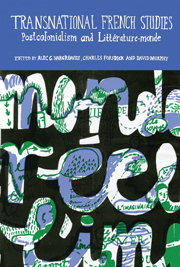Book contents
- Frontmatter
- Contents
- Acknowledgements
- Introduction: What Does Littérature-monde Mean for French, Francophone and Postcolonial Studies?
- From World Literature to Littérature-monde: Genre, History and the Globalization of Literature
- Francophone World Literature (Littérature-monde), Cosmopolitanism and Decadence: ‘Citizen of the World’ without the Citizen?
- From Weltliteratur to World Literature to Littérature-monde: The History of a Controversial Concept
- Littérature-monde in the Marketplace of Ideas: A Theoretical Discussion
- The Postcolonial Manifesto: Partisanship, Criticism and the Performance of Change
- Postcolonialism, Politics and the ‘Becoming-Transnational’ of French Studies
- Mapping Littérature-monde
- Afterword: The ‘World’ in World Literature
- Appendix: Toward a ‘World-Literature’ in French
- Notes on Contributors
The Postcolonial Manifesto: Partisanship, Criticism and the Performance of Change
from From World Literature to Littérature-monde: Genre, History and the Globalization of Literature
- Frontmatter
- Contents
- Acknowledgements
- Introduction: What Does Littérature-monde Mean for French, Francophone and Postcolonial Studies?
- From World Literature to Littérature-monde: Genre, History and the Globalization of Literature
- Francophone World Literature (Littérature-monde), Cosmopolitanism and Decadence: ‘Citizen of the World’ without the Citizen?
- From Weltliteratur to World Literature to Littérature-monde: The History of a Controversial Concept
- Littérature-monde in the Marketplace of Ideas: A Theoretical Discussion
- The Postcolonial Manifesto: Partisanship, Criticism and the Performance of Change
- Postcolonialism, Politics and the ‘Becoming-Transnational’ of French Studies
- Mapping Littérature-monde
- Afterword: The ‘World’ in World Literature
- Appendix: Toward a ‘World-Literature’ in French
- Notes on Contributors
Summary
The question of how one moves beyond the problematic legacy of colonialism and race in order to re-imagine collective identities beyond conventional conceptions of nationally defined spaces is at the heart of the littérature-monde manifesto. Since it burst on to the literary scene in early 2007, littérature-monde as a concept has thus been widely associated with a decentred and seemingly de-nationalized French-speaking world: indeed, the manifesto itself and virtually all of the essays contained in the edited volume that followed specifically reject a metropolitan-centred, ‘Francocentric’ view of literature (and, of the world, more widely). In essence, these texts imagine France as a country that exists within a transnational space that it cannot define or contain.
Nonetheless, it is my (perhaps paradoxical) contention in this chapter that the manifesto and the subsequent edited volume also pose – and, in turn, through their silences, lead the reader to pose – searching questions about the nature of both French literary culture and French national identity. In particular, I am interested in the ways in which the challenge posed to Frenchness by the littérature-monde manifesto overlaps with but also departs from what might collectively be termed a series of postcolonial challenges to received notions of Frenchness over the past decade. The privileged forms taken by this challenge have been manifestes, appels, pétitions, all of which involve groups coming together around a collectively authored – or, more accurately, as I will argue below, collectively signed – text that outlines a set of demands, grievances and/or a projected solution to the problems identified.
- Type
- Chapter
- Information
- Transnational French StudiesPostcolonialism and Littérature-monde, pp. 67 - 86Publisher: Liverpool University PressPrint publication year: 2010

